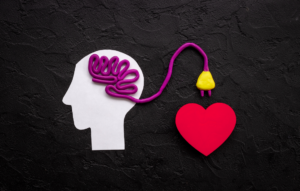In today’s fast-paced world, maintaining health can often feel like a juggling act. For a lot of guys, the focus tends to be on physical fitness or maybe addressing mental health issues in therapy. However, true well-being encompasses much more than just going to the gym or getting a therapist. This is where holistic health comes into play — a comprehensive approach that recognizes the interconnectedness of various aspects of our lives. Holistic health is the integration and balance of four key domains: mental, physical, emotional, and spiritual health. By understanding and cultivating each of these areas, we can achieve a much more profound and lasting sense of well-being.
Traditional models of health care, which often are delegated to therapy or allopathic medicine, can fall short because they, by their nature, tend not to view the human body and psyche as an interconnected system. For example, most people will find limited success, if any, in therapy, if they neglect their physical health through poor diet, lack of exercise, or inadequate sleep. Conversely, focusing solely on physical fitness without addressing emotional wounds or mental stressors can lead to a sense of emptiness and unresolved issues which ultimately sabotages the ability to sustain the physical pursuits. By integrating all four domains of health, holistic health offers a more complete and effective path to well-being.
In this blog, we’ll explore what holistic health truly means and why it’s so crucial for men’s health. We’ll look into each of the four domains, examine the limitations of conventional health models, and provide practical steps to incorporate holistic practices into your daily life. Join us on this journey to discover how embracing a holistic approach can transform your health and overall quality of life.
Understanding Holistic Health
Holistic health is so much more than just a trendy buzzword — it’s a philosophy and approach to well-being that considers the whole person. The term “holistic health” is often misused to simply refer to natural health products or alternative therapies. While these elements can certainly be part of a holistic lifestyle, true holistic health encompasses much more. It is the integration and balance of four key domains of the human experience: mental, physical, emotional, and spiritual health.
Mental Health

Mental health is foundational to holistic well-being. It involves maintaining cognitive functions & mental clarity and is the basis for emotional stability. Practices such as meditation, mindfulness, and cognitive exercises like writing are crucial for supporting mental health. These activities help to reduce stress, enhance focus, and improve overall cognitive function.
Physical Health
Physical health is often the most visible aspect of one’s well-being, encompassing fitness, nutrition, and sleep. Regular exercise strengthens the body, improves cardiovascular health, and boosts mood through the release of endorphins. A balanced diet provides essential nutrients that support bodily functions and energy levels. Adequate sleep is vital for recovery, mental sharpness, and emotional balance.
cardiovascular health, and boosts mood through the release of endorphins. A balanced diet provides essential nutrients that support bodily functions and energy levels. Adequate sleep is vital for recovery, mental sharpness, and emotional balance.
Emotional Health
Emotional health involves understanding, expressing, and managing emotions. It is closely linked to mental health but focuses more on emotional resilience and intelligence. Practices such as journaling, therapy, and participating in support groups can help individuals process emotions, develop empathy, and build stronger relationships.
groups can help individuals process emotions, develop empathy, and build stronger relationships.
Spiritual Health
Spiritual health is about finding purpose, values, and meaning in life. It does not necessarily involve religion but includes practices that nurture a sense of connection to something greater than oneself. Activities like meditation, time in nature, prayer, and community service can all help develop spiritual well-being by fostering a sense of purpose and connection to something greater than one’s ego.
community service can all help develop spiritual well-being by fostering a sense of purpose and connection to something greater than one’s ego.
By integrating these four domains, holistic health promotes a balanced and comprehensive approach to well-being. This interconnected view of health recognizes that neglecting one area can impact others, and true wellness is achieved through the harmony of all four aspects.
Limitations of Conventional Models
Therapy and allopathic medicine undoubtedly have their merits. Therapy can provide essential mental health support and allopathic medicine, is highly effective in treating a wide range of physical ailments with proven medical interventions. However, these approaches often focus on treating symptoms rather than addressing the root causes of health issues – surgery and pills can only get you so far. They also tend to view or at least treat the body and mind as separate entities, leading to fragmented care. For example, stress is a major contributing factor in all six of the leading causes of death in the United States. Conversely, someone with a chronic disease or other physical ailment is going to be also wrestling with significant mental and emotional challenges as a result of the new issue, on top of whatever stressors they were already dealing with.
tend to view or at least treat the body and mind as separate entities, leading to fragmented care. For example, stress is a major contributing factor in all six of the leading causes of death in the United States. Conversely, someone with a chronic disease or other physical ailment is going to be also wrestling with significant mental and emotional challenges as a result of the new issue, on top of whatever stressors they were already dealing with.
Traditional healthcare systems often lack integration between the different domains of health, resulting in a piecemeal approach where each aspect of health is treated in isolation. This fragmentation can lead to incomplete treatment and limited overall improvement. For instance, treating physical symptoms without addressing emotional health can leave underlying issues unresolved. A guy might be relatively physically fit but still feel unfulfilled or anxious because he isn’t addressing his emotional or spiritual needs. This lack of holistic integration can hinder true healing and well-being.
By integrating mental, physical, emotional, and spiritual health, holistic approaches provide more comprehensive care. This approach leads to better outcomes as all aspects of a person’s well-being are considered. Holistic health care by its very nature will address the root causes of health issues, promote overall balance, and help people achieve a deeper sense of well-being and self-efficacy as they master the art of self-care and genuine health. For example, a holistic health plan might include therapy for emotional health, regular exercise for physical health, meditation for mental clarity, and community service for spiritual fulfillment. This comprehensive approach will allow all facets of one’s health to be nurtured, leading to a more fulfilling and balanced life.
Four Practical Steps to Embrace Holistic Health
Assessing Your Current Health
- Self-Reflection: It all starts with awareness. Start with a thorough self-assessment to understand your current state in each of the four domains. Reflect on your mental clarity, emotional stability, physical fitness, and spiritual fulfillment. Consider keeping a journal to track your thoughts, feelings, and behaviors in each area.

- Health Check-Ins: Regularly check in with yourself to monitor changes and progress. Use questionnaires or self-assessment tools to evaluate your well-being – simply journaling regularly can do a lot. Check-ins help identify areas that need more attention and also allow you to take some pride in where you are doing well.
- Consultations: Seek professional evaluations from holistic health practitioners. They can provide a more objective assessment and recommend specific actions tailored to your needs.
Developing a Holistic Health Plan
- Goal Setting: Establish realistic and sustainable goals for each domain. A good tip for this it to ensure that your goals are specific, measurable, attainable, relevant, and time-bound (SMART). For example, set goals for daily meditation, weekly exercise routines, balanced meals, and regular community service.
- Balanced Routine: Create a daily routine that incorporates activities supporting all four domains. Start your day with a mindfulness practice to enhance mental clarity. Schedule regular physical activity to maintain fitness. Include time for emotional processing, such as journaling or talking to a therapist or coach. Dedicate moments for spiritual practices, like meditation, prayer, or engaging in meaningful hobbies.
- Nutrition and Sleep: No matter what you do you have to have a balanced diet that provides essential nutrients, and you have to ensure you get 7-9 hours of quality sleep each night – these are absolutely crucial for daily recovery and the overall health that is required to do anything well.
Seeking Holistic Health Professionals
- Finding the Right Practitioners: Look for professionals who embrace a holistic approach, such as naturopaths, integrative medicine doctors, holistic health coaches, and holistic therapists. A good practitioner in any of these positions will consider the interconnectedness of the four health domains and provide a path for comprehensive care.
- Collaborative Care: Work with a team of holistic health professionals who can address various aspects of your well-being. For instance, a naturopath can guide your physical health, while a holistic therapist can support your emotional and mental health. Collaborate with these professionals to create and maintain a personalized holistic health plan.
- Community and Support Groups: Join support groups or communities that focus on holistic health. Engaging with like-minded individuals can provide motivation, accountability, and additional resources to support your journey.

Maintaining and Adjusting Your Plan
- Regular Evaluation: Again, awareness is everything. Be sure to continuously evaluate your progress and make adjustments as needed. Life changes and new challenges may require you to tweak your plan. Stay flexible and open to modifying your routine to better suit your evolving needs.
- Celebrate Successes: Acknowledge and celebrate your achievements in each domain. Recognizing your progress can boost motivation and reinforce positive habits.
Closing Thoughts
Embracing holistic health is not just about treating symptoms; it’s about nurturing the interconnected facets of our well-being — mental, physical, emotional, and spiritual. By integrating these domains into a cohesive approach, we create a foundation for profound and lasting health benefits.
Holistic health recognizes that true wellness goes beyond the absence of illness; it encompasses a state of balance and vitality across all aspects of life. Addressing mental clarity through mindfulness, maintaining physical fitness and nutrition, nurturing emotional resilience, and fostering spiritual fulfillment are essential components of this holistic approach.
While conventional healthcare models have their strengths and uses, they often fall short of addressing the whole person. By contrast, holistic health offers a comprehensive perspective that considers the individual as a complex and interconnected system. This integration allows for more personalized and effective health management, promoting not only physical health but also emotional well-being, mental acuity, and a sense of purpose.
As you venture forward on your own holistic health journey, remember that it’s a continuous process of self-discovery and growth. Assess your current health status, develop a balanced health plan, and seek guidance from holistic health professionals who understand and support your holistic goals. Stay committed to nurturing each domain of health, and be open to adjusting your approach as you learn more about what supports your well-being best.
By prioritizing holistic health, you’re investing in a future where vitality and fulfillment are not just aspirations but daily realities that you cultivate daily. Take proactive steps today to cultivate a healthier and more balanced life — one that embraces the full spectrum of your well-being.








